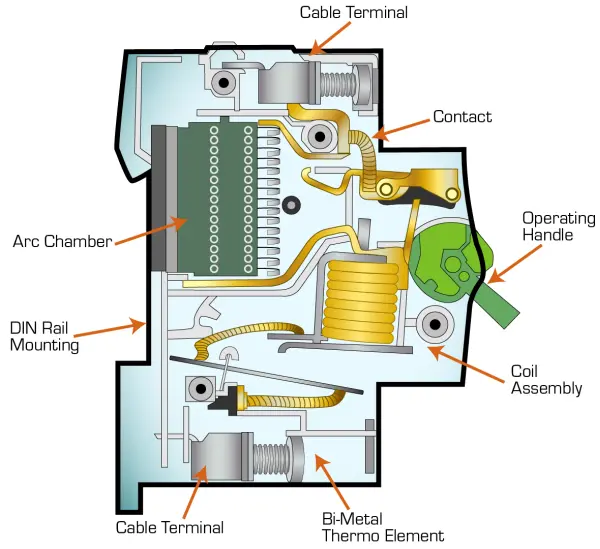Circuit Breaker Overview
A circuit breaker is an electrical switch designed to protect an electrical circuit from damage caused by excessive current flow. It is an essential component in electrical systems and is used to prevent short circuits, overloads, and electrical faults that can lead to fires or damage to equipment.

Circuit breakers come in different types and sizes, depending on their intended applications. They are used in residential, commercial, and industrial settings to protect electrical circuits and the connected devices from potential hazards. Circuit breakers are an integral part of electrical safety systems and play a crucial role in preventing electrical accidents and damage.
Circuit Breaker Classification
Circuit breakers can be classified based on various factors, including their construction, voltage rating, current rating, and application. Here are some common classifications below:
- Based on Construction:
Air Circuit Breaker (ACB): ACBs use air as the arc extinguishing medium and are primarily used for low-voltage applications.
Molded Case Circuit Breaker (MCCB): MCCBs have a molded case housing that contains the circuit breaker components and are typically used for low- to medium-voltage applications.
Miniature Circuit Breaker (MCB): MCBs are compact circuit breakers used for residential and commercial applications.
Oil Circuit Breaker: Oil circuit breakers use oil as the arc extinguishing medium and are commonly used in high-voltage applications.
- Based on Application:
Residential Circuit Breaker: These circuit breakers are commonly used in residential buildings to protect electrical circuits and appliances.
Commercial Circuit Breaker: Commercial circuit breakers are designed for use in commercial buildings, such as offices, stores, and public facilities.
Industrial Circuit Breaker: Industrial circuit breakers are rugged and designed to handle the demands of industrial environments, where higher currents and voltages are present.
Fuse and Circuit Breaker Differences
Fuses and circuit breakers are both electrical protection devices used to prevent damage to electrical circuits and equipment caused by excessive current flow. However, they function in different ways and have distinct characteristics. Here are the key differences between fuses and circuit breakers:
- Operation:
Fuse: A fuse is a one-time, non-resettable device. It contains a thin wire or strip of metal that melts when subjected to excessive current, interrupting the circuit. Once a fuse blows, it needs to be replaced with a new one.
Circuit Breaker: A circuit breaker is a resettable device. It uses a mechanical switching mechanism to open and close the circuit under normal and fault conditions. When a fault occurs, the circuit breaker trips and interrupts the current flow. It can be manually or automatically reset to restore power after the fault is cleared.
- Response Time:
Fuse: Fuses typically have a faster response time than circuit breakers. They can quickly melt and interrupt the circuit when subjected to an overcurrent condition.
Circuit Breaker: Circuit breakers may have a slightly slower response time compared to fuses. The tripping mechanism needs to detect the fault and activate the switching mechanism to open the circuit. However, modern circuit breakers are designed to respond swiftly to faults to minimize damage.
- Reusability:
Fuse: Fuses are not reusable. Once a fuse blows, it needs to be replaced with a new fuse of the appropriate rating.
Circuit Breaker: Circuit breakers are reusable. After tripping, they can be manually or automatically reset, restoring power to the circuit. This reusability eliminates the need for replacement components.
- Fault Indication:
Fuse: When a fuse blows, it physically separates or melts, providing a visible indication of a fault.
Circuit Breaker: Circuit breakers often have built-in indicators, such as trip indicators or fault lights, to indicate that a fault has occurred and the breaker has tripped.
- Cost and Maintenance:
Fuse: Fuses are generally less expensive than circuit breakers. However, the cost adds up if frequent replacements are required.
Circuit Breaker: Circuit breakers are initially more expensive than fuses, but they offer long-term cost savings due to their reusability. They also require less maintenance compared to fuses.
- Flexibility:
Fuse: Fuses are available in a limited range of current ratings and may require different types and sizes for various applications.
Circuit Breaker: Circuit breakers are available in a wide range of current ratings and can be easily adjusted and reset to accommodate different applications.
When choosing between a fuse and a circuit breaker, considerations such as the specific application requirements, fault current levels, response time needs, reusability, and cost implications should be taken into account.
